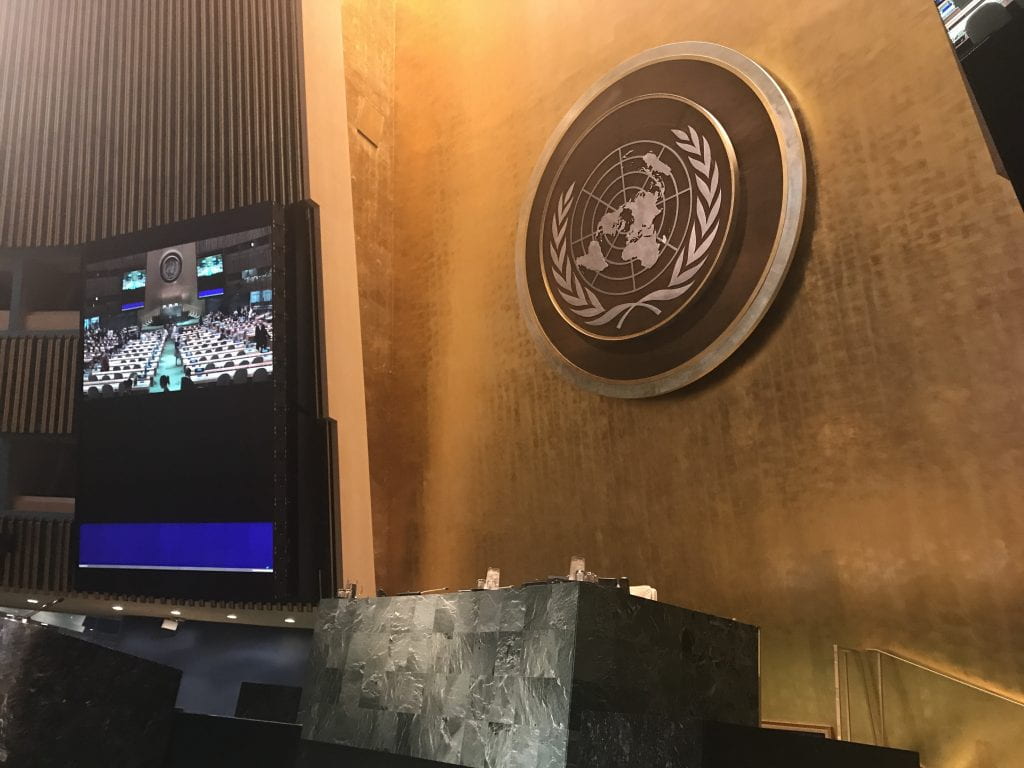by MIRANDA GRAY

As I reported to the United Nations for my first day of actual volunteering, I felt enwrapped by excitement, anticipation and fear. Working at the United Nations had been a goal of mine for years, and after a tour of the UN just a couple of months before, I left telling myself that my long nights of studying and research for my masters in the anthropology of peace and human rights would be worth it. That May morning, when I walked into the UN, with a purpose, not just as a visitor, I felt important and like I was on my way to making it. At the end of the experience, however, I had other career goals in mind.
Personally, one of the most memorable parts of the whole experience came on that first morning, when my coworker and fellow graduate student, Ajanet Rountree, made me march onto the floor of the General Assembly Hall to find the volunteer coordinator, Fred Doulton. The security guard told me when I walked in that I strictly was to stay off the floor, as those spots were reserved for state representatives and UN workers. Ajanet spotted Fred, and her confidence led me to where I needed to be. Stepping onto the plush green floors of the General Assembly was electrifying; I simultaneously felt like somebody, as tour groups walked across the upper floor, and nobody, as I walked past ambassadors and other state representatives. I am particularly thankful for that moment and the ability to witness such an intricate and important session.
During the opening session when states stated their progress since the last conference, I became aware of the many moving pieces and challenges states must grapple with in advocating for the rights of persons with disabilities. Lack of awareness and resources as well as increased social exclusion have all impeded progress in protecting and ensuring rights of persons with disabilities. Many nations implored the other members of the conference for more concrete data on persons with disabilities in order to better tailor advocacy measures to persons with disabilities. However, the second session I took notes on truly opened my eyes to the other pieces of the advocacy puzzle, in addition to states, and tempered my opinion of a United Nations career as the ultimate goal for a human rights worker.
My second volunteer session incorporated statements given by several nongovernmental organizations. These organizations seemed to have specific goals and methods of implementation that might drastically improve lives of persons with disabilities. I realized that a great deal of the accomplishments that states reported on were often directly because of the work of NGOs. I previously thought of work with NGos as stepping stones to the ultimate career with the United Nations. And while working at the United Nations is still a career goal of mine, I have come to realize that meaningful necessary work is not a stepping stone, but rather the ultimate career in and of itself. When I heard NGO workers talk about the most important aspects of rights of persons with disabilities, I left feeling personally challenged to advocate for others in an inclusive manner that promotes full participation and addresses the impact of multiple discriminators on persons with disabilities, specifically women and children. I realized that day that no matter the name on the door, doing good work for people would always be admirable.
Before volunteering at the United Nations’ Conference of State Parties on the Rights of Persons with Disabilities, I do not think rights of persons with disabilities were at the forefront of my mind of imminently pressing human rights issues. My previous studies have mostly focused on the rights of persons in areas of conflict, and those studies more specifically have been focused on the right to life. But following my experience volunteering at the Conference of State Parties on the Rights of Persons with Disabilities, I left having learned that any study on human rights violations should be inclusive of the particular violations persons with disabilities face. I left feeling a call to action, to advocate for persons with disabilities by listening to persons with disabilities, hearing their opinions, and acting accordingly. As I returned to UAB and Birmingham, I operate with a heightened sense of the lack of accessibility in our city, and I feel equipped with the drive and tools afforded me through my week at the UN to do something about it.

